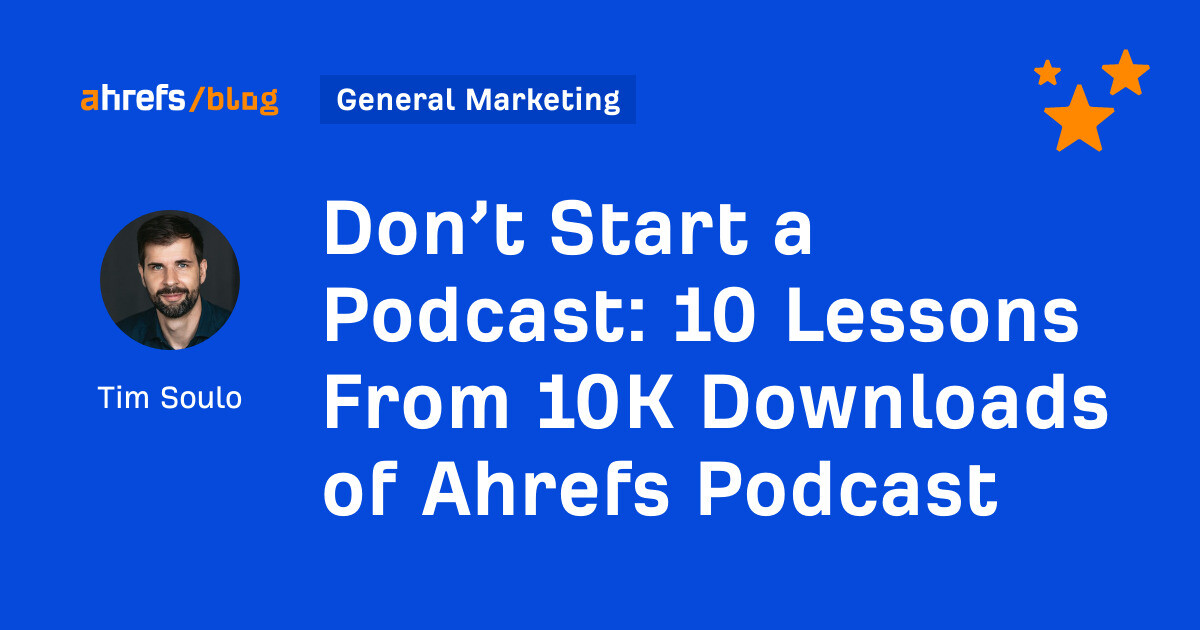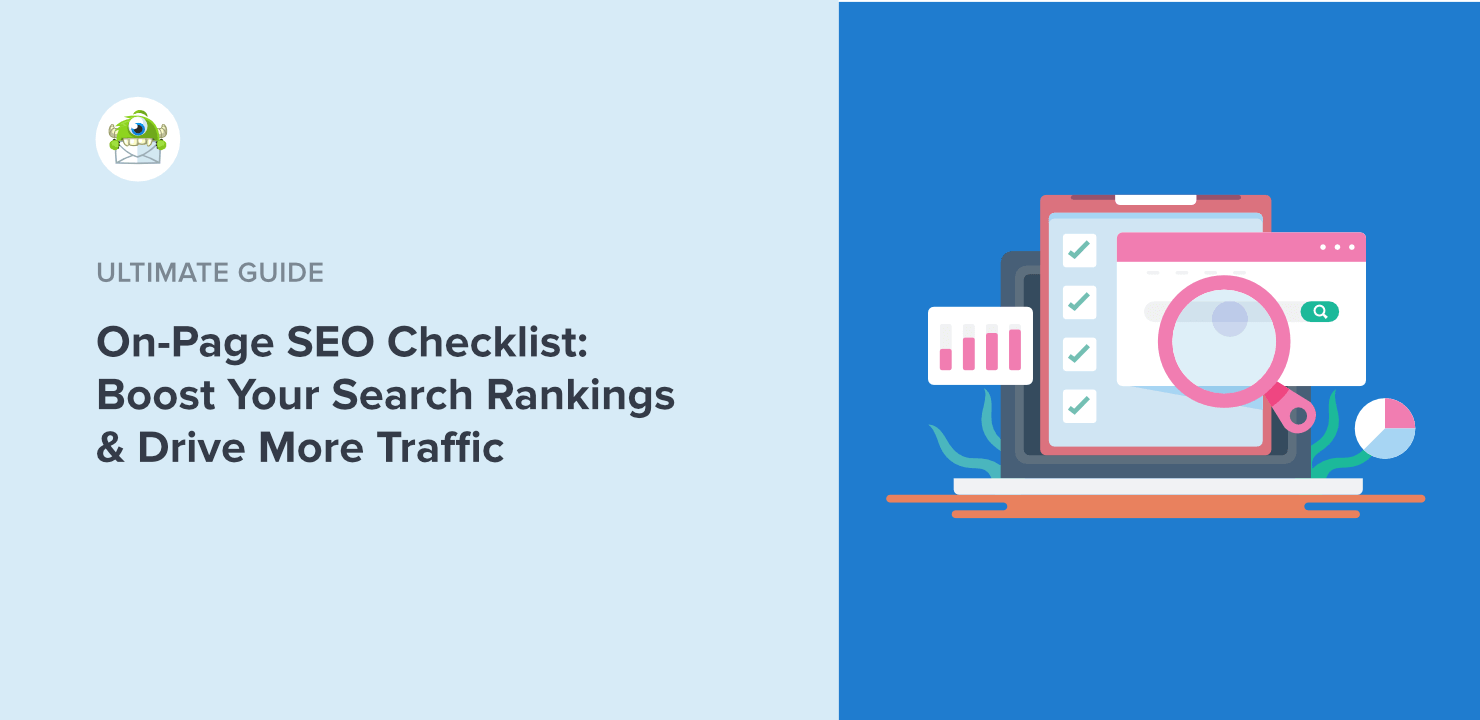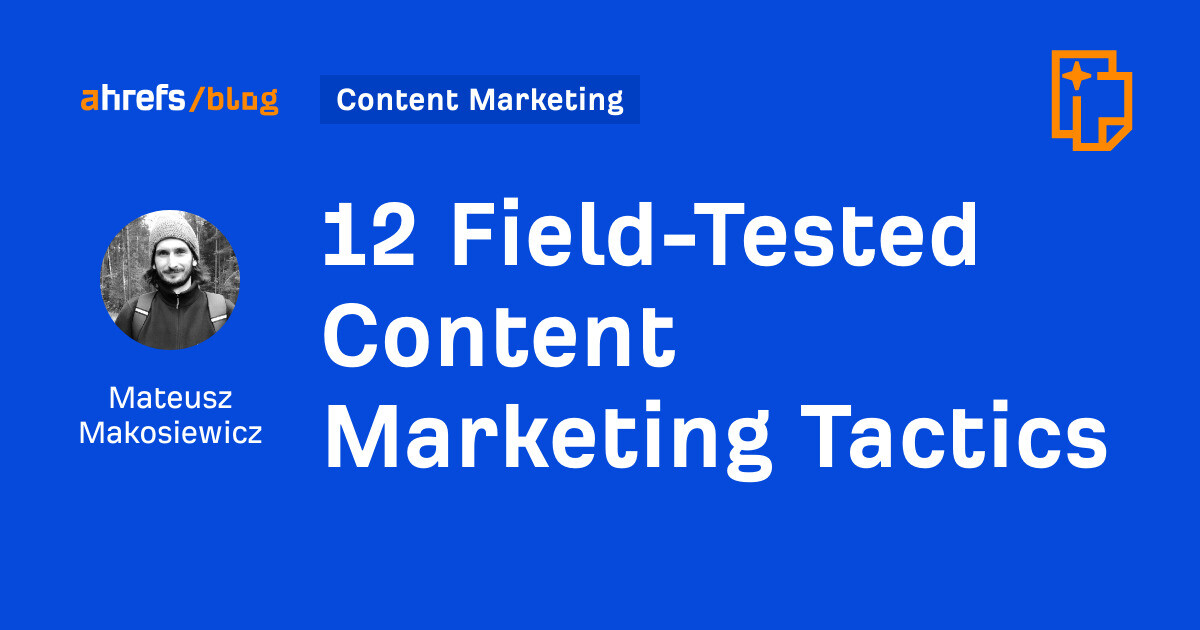[ad_1]
Many individuals discuss how necessary it’s to have a “low bounce charge.”
However bounce charge is among the most misunderstood metrics in website positioning and digital advertising.
This text will discover the complexities of bounce charge and why it’s not as simple as you would possibly suppose.
You’ll additionally learn to analyze your bounce utilizing Google Analytics 4 exploration reviews.
With a view to perceive what bounce charge is, we have to outline what engaged classes are in response to GA4.
What Is An Engaged Session?
An engaged session in GA4 is a session which meets both of the next standards:
- Lasts at the least 10 seconds.
- Has key occasion (previously conversions).
- Has at the least two display screen views (or pageviews).
Merely put, if a person lands in your homepage and leaves with out changing (key occasion), that might produce a one hundred pc bounce charge for that session.
If one lands and visits a second web page or indicators up on your e-newsletter (as you outlined it as a key occasion), that might imply the bounce charge for that session is 0%.
What Is Bounce Charge In Google Analytics?
Bounce charge is a share of unengaged classes, and it’s calculated with the next system:
(whole classes/unengaged classes)*100.
So, it’s not solely visiting a second web page that brings the bounce charge down but in addition when key occasions happen.
You may arrange any occasion, both built-in or custom-defined in Google Analytics 4 (GA4), to depend as a key occasion (previously conversion), and in instances when it happens in the course of the session, will probably be counted as a non-bounce go to.
Right here is tips on how to outline any occasion as a key occasion:
- Navigate to Admin.
- Underneath Information show, navigate to Occasions.
- Discover the occasion you have an interest in and toggle Mark as key occasion to show it blue.
-
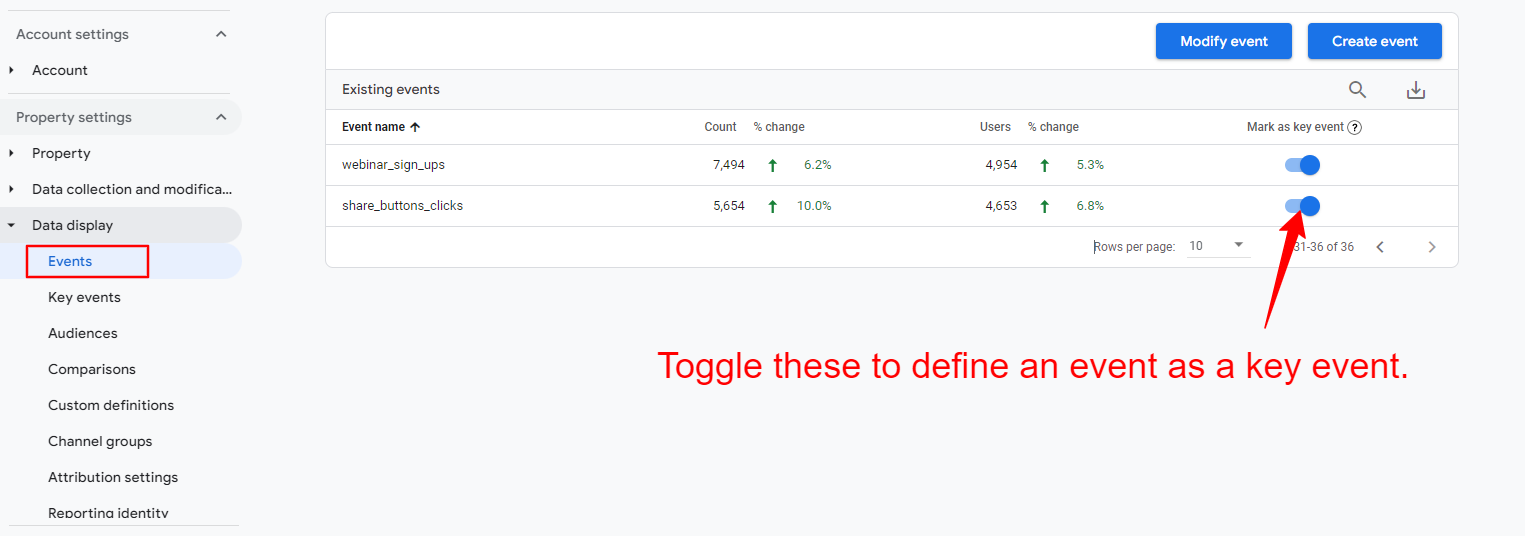 How one can mark occasions as key occasions in GA.
How one can mark occasions as key occasions in GA.
How To Change The Default Engaged Session Timer In GA4
As a marketer, you might need to regulate the default 10-second timer for engaged classes primarily based in your challenge wants.
For instance, when you have a weblog article, you might need to set the timer as excessive as 20 seconds, however when you have a product web page the place customers usually take extra time to discover particulars, you would possibly enhance the timer to 30 seconds to higher replicate person engagement.
To vary:
- Navigate to Information streams and click on on the stream.
- Within the slide popup, navigate to Configure tag settings.
- Within the second slide popup, click on Show extra on the backside.
- Click on on the Regulate session timeout setting.
- Change Regulate timer for engaged classes to the worth of your selection.
Right here is the detailed video information on tips on how to regulate the timer for engaged classes:
What Is A Good Bounce Charge?
So, it’s not as simple as saying, “Instance.com has a bounce charge of 43 p.c, and example2.com has a bounce charge of 20 p.c; due to this fact, example2.com performs higher.”
For instance, when you search [what’s on at the cinema…], then land on an internet site and must dig by way of 5 pages of the positioning to seek out what’s exhibiting, the web site might need a low bounce charge however can have a poor person expertise.
On this case, that’s deceptive when you think about a low bounce charge good.
On prime of that, what use is there in measuring the bounce charge for the entire web site when you’ve got numerous completely different templates which are laid out and designed in numerous methods, and also you observe ‘key occasions,’ aka conversions, otherwise?
Normally, this reveals that your advertising is efficient and well-targeted, and guests are participating together with your content material and desirous to know extra.
Keep in mind, bounce charge isn’t a rating issue, however when customers navigate deeper into your pages, it’s an engagement rating sign that Google could bear in mind, in response to what Google’s Pandu Nayak stated throughout hearings.
That stated, it might make sense to trace the variety of classes with two or extra pageviews in GA4, which you’ll need to think about as a KPI when reporting.
How To Set Up A Customized Viewers With A number of Pageviews Per Session
If you wish to know what number of guests you’ve got who’ve greater than two web page views in a session, you possibly can simply set it up in GA4.
To do this:
- Navigate to Admin.
- Underneath Information show, navigate to Audiences.
- Click on the New Viewers blue button on the highest proper nook.
- Click on Create {custom} viewers.
- Arrange a reputation on your viewers.
- Choose scope to “Throughout the similar session.”
- Choose session_start.
- Click on And and choose “page_views” with the parameter with “Occasion depend” better than one.
You merely inform it so as to add to my viewers all customers who seen greater than two pages inside the similar session. Here’s a fast video information on how to try this.
You may arrange audiences with any granularity, like classes with precisely two or three pageviews and better than three pageviews.
Later, you possibly can filter your commonplace reviews utilizing your {custom} audiences.
How To Do Bounce Charge Reporting And Audit
Subsequent time your boss or shopper asks you, “Why is my bounce charge so excessive?” – first, ship them this text.
Second, conduct an in-depth bounce charge audit to know what’s occurring.
Right here’s how I do it.
Bounce Charge by Date Vary
Have a look at bounce charges in your web site for a specific interval. That is the most straightforward reporting on bounce charge.
To do this:
- Navigate to Explorations on the right-side menu.
- Click on ‘Clean’ report.
- From Metrics select “Bounce charge.”
- Set Values to a “Bounce charge.”
- Underneath Settings (2nd column), select visualization sort “Line chart.”
- Choose the date interval of your selection.
-
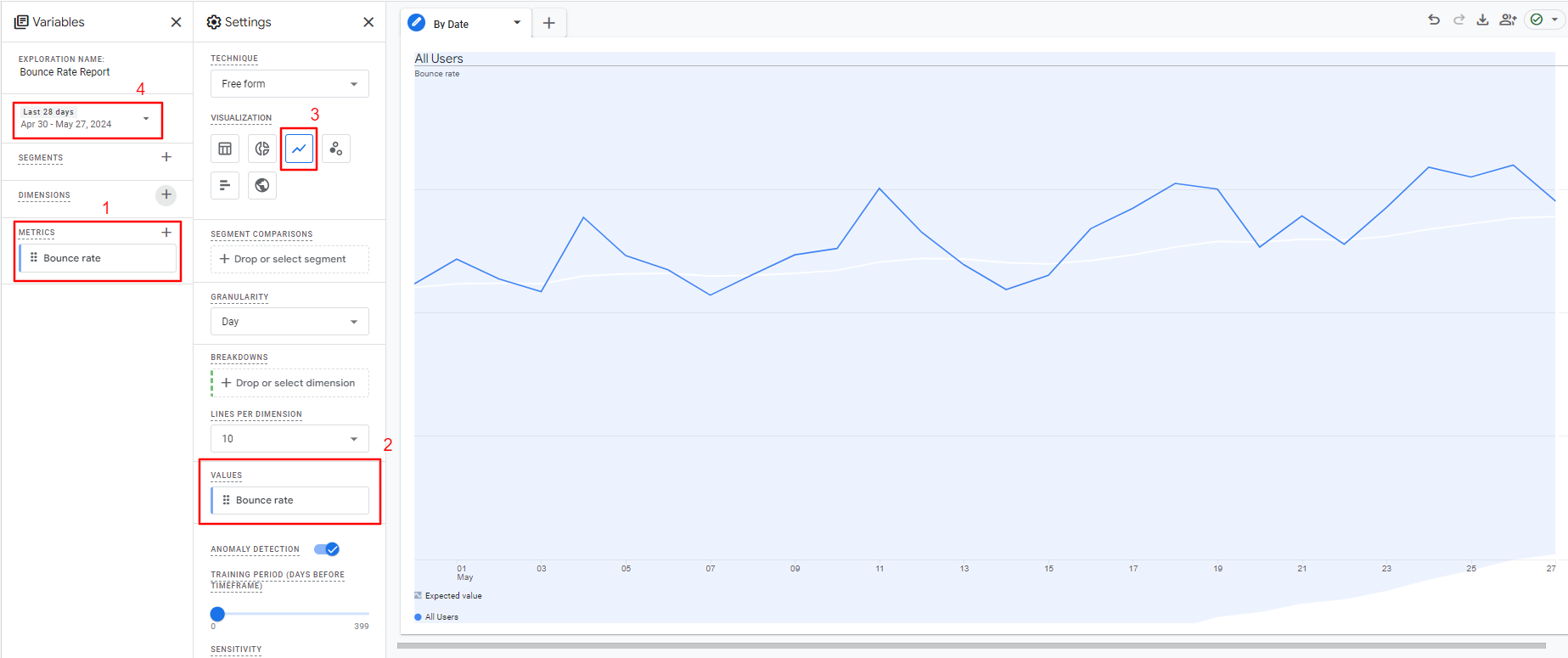 How one can arrange a bounce charge report for the whole web site by date vary.
How one can arrange a bounce charge report for the whole web site by date vary.
In the event you see spikes within the chart, it might point out a change you made to the web site that influenced the bounce charge.
How To Analyze Bounce Charge On A Web page Stage
When working a lead technology marketing campaign on many various touchdown pages, evaluating which pages convert properly or poorly is important to optimize them for higher efficiency.
One other instance use case of page-level bounce reviews is A/B testing.
To do this:
- Navigate to Explorations on the right-side menu.
- Click on Clean report.
- From Metrics, select Bounce charge and Periods.
- From Dimensions, select Touchdown web page + question string.
- Underneath Settings (second column), select visualization sort ‘Desk.”
- Set Rows to a “Touchdown web page + question string.”
- Set Values to a “Bounce charge: and “Periods.”
- Set the filter to incorporate pages with greater than 100 classes ( to make sure the information you’re mining is statistically vital).
- Choose the date interval of your selection.
Tip: You don’t have to create a brand new clean exploration report; as an alternative, add one other tab to the identical report and alter solely the configuration.
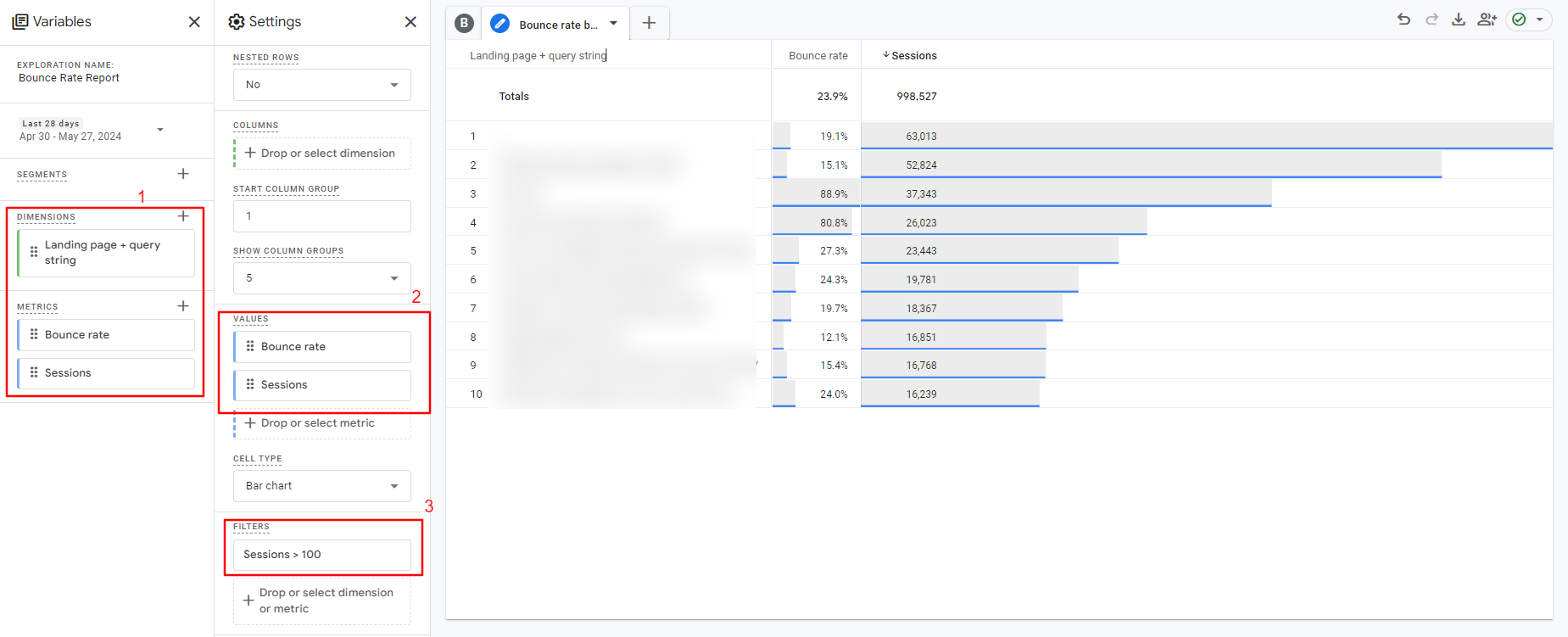 How one can arrange web page level-bounce charge report.
How one can arrange web page level-bounce charge report.If we don’t filter by classes quantity, you’ll be bounce charges on some pages with just one or two classes, which doesn’t let you know something.
When you’ve accomplished the above, repeat the method per channel to realize an much more rounded understanding of what content material/supply mixtures produce probably the most or least engaged visits.
How To Analyze Your Bounce Charges By Site visitors Channel
Bounce charges might be wildly completely different relying on the supply of visitors.
For instance, it’s probably that search visitors will produce a low bounce charge whereas social and show visitors would possibly produce a excessive bounce charge.
So that you even have to think about bounce charge on a channel stage in addition to on a web page stage.
The bounce charge from social and show is nearly at all times increased than “inbound” channels for these causes:
- When a person is on social media trying by way of their information feed, they’re (typically) not actively searching for what we’re selling.
- When a person sees a banner advert on one other web site, they’re (typically) not actively searching for what we’re selling.
Nonetheless, for inbound channels like natural and paid search, it’s logical that the bounce charge is decrease as these customers are actively trying to find what you’re selling.
So, you seize their consideration in the course of the “doing” part of their purchaser’s journey (relying on the search time period in query).
To dig deeper into every one:
- From Metrics, select Bounce charge and Periods.
- From Dimensions, select Session default channel group.
- Underneath Settings (second column), select visualization sort Desk.
- Set Rows to a Session default channel group.
- Set Values to a Bounce charge and Periods.
- Choose the date interval of your selection.
-
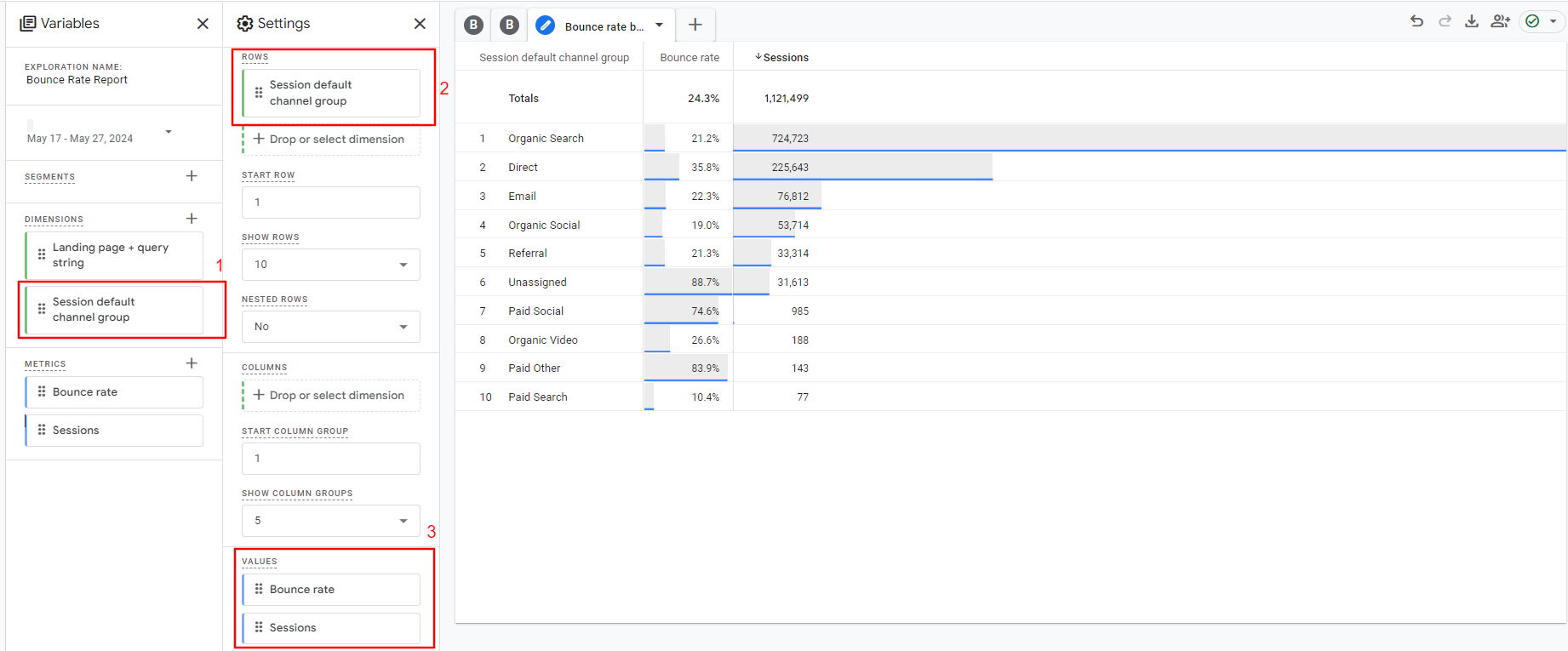 How one can arrange a bounce charge report by visitors channels.
How one can arrange a bounce charge report by visitors channels.
Somewhat homework: Attempt to plot a line graph primarily based on the bounce charge on your natural visitors.
Now, you possibly can dig deeper into the information and search for patterns or causes that one web page or set of pages/supply or set of sources has the next or decrease bounce charge.
Compile the data in an easy-to-read format, ping it to the powers that be, and head for a congratulatory espresso.
Do You Have The Proper Intent?
Generally, you’ll discover pages that rank in search engines like google and yahoo for phrases which have a couple of which means.
For instance, a latest one I found was a web page on an internet site I handle that ranks first for the search time period ‘Alang Alang’ (the identify of a villa), however Alang Alang can be the identify of a movie.
The villa web page had a excessive bounce charge, and one purpose for that is that among the guests touchdown on that web page had been truly searching for the movie, not the villa.
By doing key phrase and competitors analysis to see what outcomes your goal key phrases produce, you possibly can shortly perceive when you have any pages that rank properly for phrases that might be supposed for different subjects.
Whenever you establish such pages, you’ve got three choices:
- Utterly change your key phrase concentrating on.
- Take away the web page from the SERPs.
- Overhaul your title and meta description, so searchers know explicitly what the web page is about earlier than they click on.
How To Enhance Web site Engagement
Now you’ve discovered what’s going improper, you’re all set to make some modifications.
All of this is determined by your examine’s findings, so not all of those factors are related to each state of affairs, however this ought to be a superb start line.
Most significantly observe {custom} occasions as “key occasions” (conversions) so issues like e-newsletter sign-ups lead to Google Analytics classifying that as a non-bounce even when the person didn’t go to a second web page.
Is Excessive Bounce Charge Unhealthy?
Hopefully, you now perceive why bounce charge isn’t merely “excessive” or “low”. It is determined by many elements, and there’s no single reply to the query, “Is excessive bounce charge dangerous?”
In the event you outlined your ‘key occasions’ (conversions) and GA4 settings appropriately on your objectives, a excessive bounce ( +90% ) charge is unquestionably regarding as a result of it means your guests don’t have interaction sufficient together with your webpages.
However when you have GA4 on default settings, you possibly can by no means depend on information due to the explanations we mentioned above.
By no means assume something. Do your analysis and be sure you configure your GA4 account correctly to trace ‘key occasions.’
Now, go forth and conquer your bounce charge!
Extra sources:
Featured Picture: eamesBot/Shutterstock
[ad_2]


